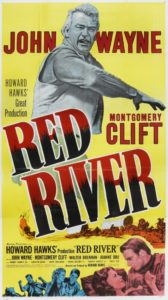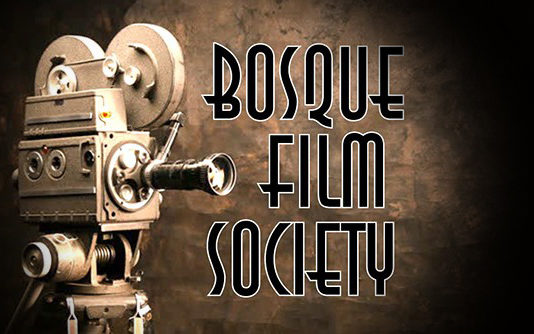Meridian Parks & Recreation hosts first outdoor movie night by showing the John Wayne western classic “Red River” at the John A. Lomax Amphitheater
by SIMONE WICHERS-VOSS
Bosque Film Society Board Member
MERIDIAN — With its history inextricably tied to the development of the Western frontier and the Chisholm Trail cattle drives, the City of Meridian remains a rural town visibly embracing its roots. Many historic accounts surrounding the county’s establishment are filled with stories of rough and ready men and women facing arduous conditions as they settled the land.
Fittingly tying into that history, the Meridian Parks & Recreations Department chose a classic western film – an iconic movie with a legendary actor depicting the first cattle drive along the Chisholm Trail – for its first free outdoor movie night Saturday, Nov. 21 at 6 p.m. at the John A. Lomax Amphitheater in Meridian Park.

Come and enjoy Howard Hawk’s classic western “Red River” starring John Wayne and Montgomery Clift in the beautiful outdoor setting under the stars. Come early and listen to country western music in the park, and plan to enjoy a classic movie experience with a Looney Tunes cartoon short and a classic upcoming attractions preview prior to the feature film.
Be sure to bring a blanket to keep warm in the cool evening air and your own a lawn chair or stadium seat for comfort. The Parks & Rec volunteers will offer hot dogs, water and $1 bags of popcorn from the Hico Popcorn Factory on sale.
In reality, the showing will be a test screening to try out new projection and audio equipment for what the Parks & Rec events committee plans to make a monthly event. After this month’s test run, the Parks & Rec will present the modern holiday classic “The Polar Express” Saturday, Dec. 12. In case of inclement weather, the free movie night will be moved into the Meridian Civic Center as a back-up plan.
“We are really excited to begin utilizing the Lomax Amphitheater in this way,” Parks & Rec Activities Director Brett Voss said. “While we plan to host a variety of activities at the amphitheater, we want the outdoor movie night to be a monthly event the entire family anticipates in our community.”
The epic western film “Red River” offers a fictional account of the first cattle drive from Texas to Kansas along the Chisholm Trail, complete with the classic story line of an older man’s struggles as a young man takes over his role and all the drama that comes with that conflict. Screenwriter Borden Chase readily admitted that the storyline was “Mutiny on the Bounty with saddles and stirrups.”
Because of financial woes, fourteen years after starting his cattle ranch in Texas, Tom Dunston (John Wayne) has to drive his 10,000 head of cattle to market in Missouri, a 1,000 miles away. Dunston’s grizzled demeanor and tyrannical leadership soon leads to contention among the cow hands on the drive, leading to his adopted son Matt Garth (Montgomery Clift) taking over the reins.
Red River was especially notable for the performances by Wayne and Clift in roles originally envisioned for Gary Cooper and Cary Grant. The movie also comes with legendary and phenomenal stampede and river crossing scenes. And it ends in an epic brawl between Dunston and Garth. And of course, there is the compulsory romantic side line with an exquisite leading lady Fen (Colleen Gray.)

Other noteworthy cast members include Walter Brennan, Joanne Dru, Harry Carey, John Ireland, Noah Beery, Jr., Harry Carey Jr. as well as a very young and uncredited character actor Richard Farnsworth, who played coach Red Blow in the baseball classic, “The Natural.”
Whereas the classic western film is based on a novel portraying the late nineteenth-century expeditions along the Chisholm Trail, Hawks was less interested in historical accuracy than portraying the raw macho world of the cowboys and cattle men that launched the myths of the American West.
The “Take ’em to Missouri, Matt!” scene remains one of the quintessential Western scenes with Hawk’s famous footage of weathered cowboy faces in closeup and as they cry “Hee-yaw!” and wave their hats, ready to take on the grueling drive.
Clift was nervous about standing up to Wayne but gained confidence when director Hawks told him to play his scenes like David against Goliath. He also urged the young actor to underplay in his scenes with Wayne, particularly the scene in which his character challenges Dunson for the first time. Wayne was also not sure Clift could be convincing as a rugged cowboy, but after that first confrontation scene he told Hawks his doubts were gone and “he’s going to be okay.”
The final confrontation in Red River is cited by Martin Scorsese as a direct influence on the scene in Goodfellas, where Henry Hill (Ray Liotta) walks across the street, attacks the neighbor who had upset Karen and walks back in one continuous shot.
Many fans love the rugged man’s man Wayne naturally portrays. But thanks to this motion picture, he became more known for his superior acting abilities, cited as one of his finest roles.

At the beginning of the movie, Wayne is tall and steady, ever so gradually transitioning to an old, worn out, defeated cowboy with haggard eyes. After seeing Wayne’s performance in the film, rival director John Ford is quoted as saying, “I never knew the big son of a bitch could act.”
The movie directly led to Ford casting Wayne in more complex, multi-layered, and dramatic roles in films like “She Wore a Yellow Ribbon,” “The Searchers” and “The Man Who Shot Liberty Valance.”
A tribute to his influence on the Western genre, six of John Wayne’s movies are on different top 20 Best Westerns of All Time lists. Red River was filmed in 1946 but held for release for two years, in part due to legal problems with Howard Hughes, who claimed it was similar to his 1943 film, “The Outlaw.” Upon its release in 1948, Red River was both a commercial and a critical success and was nominated for two Academy Awards for Best Film Editing by Christian Nyby and Best Writing, Motion Picture Story by Borden Chase.
Annually, the National Film Registry selects 25 films showcasing the range and diversity of American film heritage to increase awareness for its preservation. Selected by the Library of Congress for preservation in the National Film Library in 1990, Red River was selected into the National Film Registry in 1990 for being “culturally, historically, or aesthetically significant.”
Photos by SIMONE WICHERS-VOSS & courtesy of NATIONAL FILM REGISTRY
